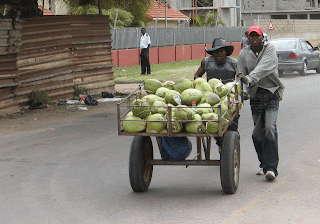Sunday Afternoon in Maputo
The cool temperatures (mid 70s) and overcast skies made Maputo quite pleasant today. I'm not sure where the stormy weather came from - perhaps a tail from Cyclone Indlala that is sacking Madagascar right now. KwaZulu-Natal had some freakish weather earlier this week that killed several people. Then, there is the shitstorm that has been heating up Zimbabwe over the past few years.
Coconut vendors - A good drink at the beach.
A couple of hard-bargaining beach salesmen. They tried to get me a few minutes later, but I had no money. They also didn't realize that I knew the current SA Rand to US Dollars to Moz. Metacais exchange rates and can calculate that sort of thing in my head.
Futebol is very popular. Most players are barefoot, but check out the red socks on the guy in the second picture.

Boys with new toys. Kids here are pretty inventive and imaginative. I guess that's what happens when you don't have much access to t.v., video games, and money to buy lots of toys. The toys kids make here are pretty cool. 
Future DJ
One more since this kid was such a ham.
These ladies were having a great time gossiping and laughing despite the back-breaking chore of washing clothes by hand and fetching water. They loved it when I tested out my Changaan. The adults seemed pleasantly surprised that I could say hello respectfully and tell them that I was a student of their language and culture in Changaan. The children found the mulunga (white person) who could speak their language hysterical - almost to the point of ROTGL.
Since it is a Sunday afternoon, these kids may be working just to give their parents or grandparents a day off. But maybe not. School is not free in Mozambique. It costs money for tuition, uniforms, supplies, and books. Parents struggle to send their kids to school. I don't know what the fees and supplies cost, but the average yearly salary is maybe 200-300 USD. On regular school days, I often see children working - selling cashews, newspapers, oranges. Other children work with their parents and sell food at the markets. Orphaned children beg and will carry your groceries at Mercado Central in exchange for a few metacais. School, in general, is not free in southern Africa. Pretoria had a student group march and run amok on Friday demanding free education for South African students.
Famba khwatsi.










